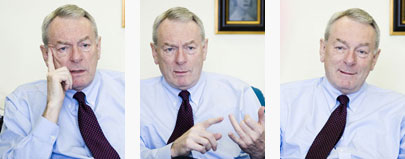Entre Nous with Richard Pound, Chancellor
Entre Nous with Richard Pound, Chancellor McGill University
User Tools (skip):

"The best part of being Chancellor is at convocation when you see all the finished products walking across the stage," says Richard Pound. "It's a great feeling of accomplishment."
Entre nous with Richard Pound, Chancellor
Fair play's vocal champion
His allies call him the sports world's conscience. His critics, some of them athletes doing their best to deny a positive test result, call him a pit bull. Here at McGill, we call him Chancellor. Considered one of the most influential men in sports, Dick Pound was largely responsible for brokering the television deal that turned the Olympics into a billion-dollar industry long before he became known as the sardonic, straight-shooting drug czar at the World Anti-Doping Agency (WADA). A favourite with reporters for his damn-the-torpedoes attitude when it comes to speaking his mind, Pound sat down with the McGill Reporter to talk a little sports.
So, tell us, what exactly does the Chancellor do?
There are certain statutory duties, including presiding over every convocation. I also chair the honorary degrees committee, the athletics committee and the joint meetings of the Senate and Board of Governors. As well, I'm on the Board of Governors and the Executive Committee.
Other than that, it's a lot of kissing babies and cutting ribbons.
Why do so many people — Lance Armstrong, for one — like to take shots at you in the media?
I'm the visible head. They think, "If you can stop Pound, you can stop WADA."
But you're not going to stop me and you're certainly not going to stop WADA.
Much has been made of your in-your-face approach to catching and ridiculing athletes who take performance-enhancing drugs. Is this just the way this fight has to be fought?
I believe so. I don't think you can sit around and do this Zen-like—Om—and it will all go away. These people are organized cheaters, so we've got to grab their attention and make them stop.
How do we get better at catching them?
We need the help of governments, because we don't have the power to go into people's offices and seize evidence or compel witnesses to give evidence under oath. All the big busts, like what we saw with BALCO [the 2003 Bay Area lab that supplied numerous Olympic athletes and professional baseball and football players with performance-enhancing drugs] are government operations. The good news is that 191 countries have ratified the UNESCO anti-doping convention, so we've made some great progress.
But we still seem far away from where we want to be.
Nothing is going to happen overnight; it'll probably take a generation. But if 10 years ago I told you that in 2007 you wouldn't be able to smoke in a restaurant in France, you would have called me crazy. Eventually we'll get there—my job is to get it on the radar.
Why not let these people do what they want to do?
Some of these products are really dangerous. If you're doing EPO, your blood is like sludge. Then you ride your bike for two to three hours and pulse rate is at 220—your heart can't take it.
There's also the downward influence. If Barry Bonds is doing it then the guys in AAA think, "If I want to be like Barry Bonds, I'd better do it." Then the guys in AA and A. Then college ball players and high school kids. Instead of a few consenting adults at the top, you get this pyramid of hundreds of thousands.
You've been particularly critical of the drug policies of pro sports, which amount to little more than a slap on the wrist for offenders. Why are they so lax?
There are none so blind as those who will not see. They don't want to deal with the problem because they think that they will lose face or that their sport will suffer. I think they've abandoned their responsibility.
Here in Canada you caused quite the firestorm when you suggested that one-third of NHL players were taking some sort of performance-enhancing drugs.
[Laughing] Yeah, it depends on whose ox is getting gored, I guess. That's one where everyone knows the situation but no one talks about it. I had people coming up and telling me that it's a lot more.
Every five goals extra you score per season is another half-million bucks in a player's pocket. But the [NHL Commissioner, Gary] Bettmans and the [NHL Player's Association union leader, Ted] Saskins of the world say "We don't have a problem in hockey because none of that stuff would help a hockey player." How stupid is that? It's an insult to anyone's intelligence.
Why are you so passionate about this issue?
Sports rules are artificial. Why is a shot put 16 pounds? Why 100 metres? It's a deal we made to say, "Let's see who can accomplish the agreed-upon challenge the best within the rules we agreed upon." It's like a social contract. It's a deal. If you're competing against me, I'm entitled to expect that you'll follow those rules. That's what sports should be. If somebody's really screwing with you, it destroys the whole point.
At their best, sports give you healthy, well-motivated, goal-setting, hard-working people with a well-developed sense of ethics and fair play who are going to bring all those skills to their community. By the same token, if you're out there wearing your halo in public and you know what lies behind the door, it's a disgusting picture.
These days you might as well take your kid to the game and say, "One day, my boy, if you put enough crap into your system and lie convincingly enough, you can play our national sport." Is that what people want? No.

